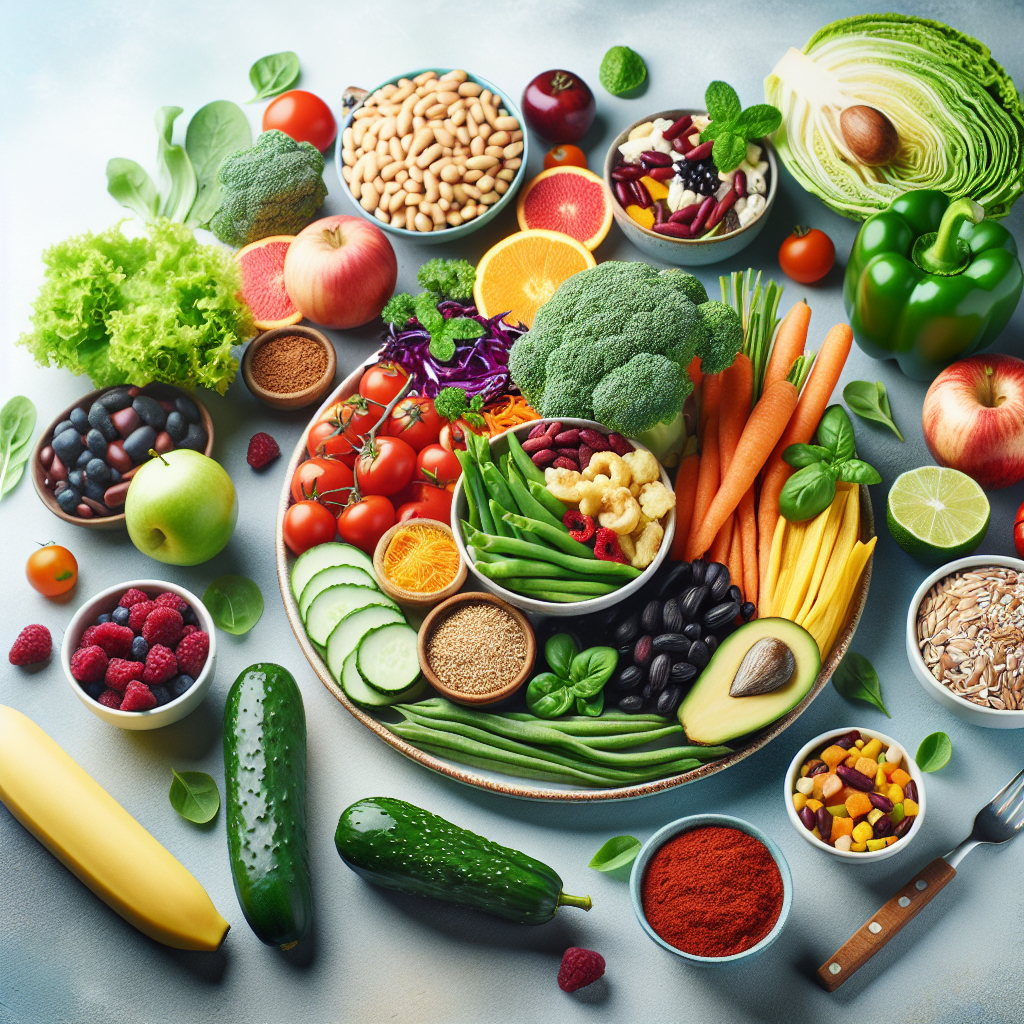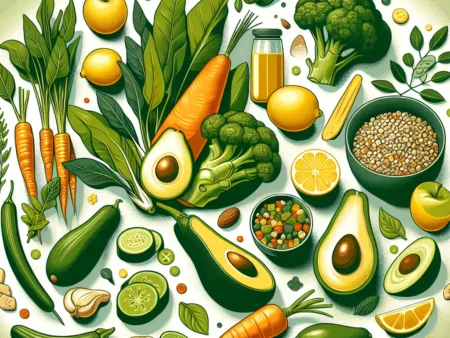Kombinasi menu sehat untuk diet vegetarian: penuh nutrisi, rendah kalori, dan mengandung sumber protein nabati.
Kombinasi Menu Sehat untuk Diet Vegetarian
-
Table of Contents
- Introduction
- The Benefits of a Vegetarian Diet
- 1. Lower Risk of Chronic Diseases
- 2. Weight Management
- 3. Improved Digestion
- 4. Environmental Sustainability
- Understanding Nutritional Needs
- 1. Protein
- 2. Iron
- 3. Vitamin B12
- 4. Omega-3 Fatty Acids
- Combining Healthy Menus for a Vegetarian Diet
- 1. Breakfast: Overnight Chia Pudding
- 2. Lunch: Quinoa Salad
- 3. Dinner: Stir-Fried Tofu with Vegetables
- Summary
Introduction

With the increasing popularity of vegetarianism in Indonesia, it is important to understand how to maintain a healthy diet while following a vegetarian lifestyle. A well-balanced vegetarian diet can provide all the necessary nutrients for optimal health, but it requires careful planning and consideration of food combinations. In this article, we will explore the concept of combining healthy menus for a vegetarian diet in Indonesia.
The Benefits of a Vegetarian Diet
Before diving into the specifics of combining healthy menus, let’s first understand the benefits of a vegetarian diet. Numerous studies have shown that a well-planned vegetarian diet can provide several health benefits, including:
1. Lower Risk of Chronic Diseases
A vegetarian diet, when properly balanced, can help reduce the risk of chronic diseases such as heart disease, high blood pressure, type 2 diabetes, and certain types of cancer. This is mainly due to the higher intake of fruits, vegetables, whole grains, and legumes, which are rich in essential nutrients and antioxidants.
2. Weight Management
Vegetarian diets are often associated with lower body mass index (BMI) and reduced obesity rates. Plant-based foods are generally lower in calories and saturated fats, making them an excellent choice for weight management.
3. Improved Digestion
Vegetarian diets are typically high in fiber, which aids in digestion and promotes regular bowel movements. This can help prevent constipation and other digestive issues.
4. Environmental Sustainability
Choosing a vegetarian diet also has positive environmental impacts. Livestock production is a major contributor to greenhouse gas emissions and deforestation. By reducing or eliminating animal products from our diet, we can help mitigate climate change and preserve natural resources.
Understanding Nutritional Needs
While a vegetarian diet can offer numerous health benefits, it is essential to understand the nutritional needs and potential deficiencies that may arise. Key nutrients that require attention in a vegetarian diet include:
1. Protein
Protein is an essential macronutrient that plays a crucial role in building and repairing tissues, producing enzymes and hormones, and supporting a healthy immune system. Plant-based sources of protein include legumes, tofu, tempeh, seitan, quinoa, and nuts.
2. Iron
Iron is necessary for the production of red blood cells and oxygen transport throughout the body. While plant-based sources of iron are available, they are less easily absorbed by the body compared to animal-based sources. Combining iron-rich foods with vitamin C-rich foods can enhance iron absorption. Good vegetarian sources of iron include dark leafy greens, lentils, beans, and fortified cereals.
3. Vitamin B12
Vitamin B12 is primarily found in animal products, making it a potential concern for vegetarians. It is essential for nerve function and the production of red blood cells. Vegetarians can obtain vitamin B12 from fortified foods such as plant-based milk, breakfast cereals, and nutritional yeast. However, it is recommended to consult a healthcare professional for supplementation if necessary.
4. Omega-3 Fatty Acids
Omega-3 fatty acids are crucial for brain health and reducing inflammation in the body. While fish is a common source of omega-3s, vegetarians can obtain them from plant-based sources such as flaxseeds, chia seeds, walnuts, and algae-based supplements.
Combining Healthy Menus for a Vegetarian Diet
Now that we understand the nutritional needs of a vegetarian diet, let’s explore some delicious and nutritious combinations of menus for a healthy vegetarian lifestyle:
1. Breakfast: Overnight Chia Pudding
Ingredients:
- 2 tablespoons of chia seeds
- 1 cup of plant-based milk (such as almond or soy milk)
- 1 tablespoon of maple syrup or honey
- Fresh fruits and nuts for topping
Instructions:
- In a jar or bowl, mix chia seeds, plant-based milk, and sweetener.
- Stir well and refrigerate overnight.
- In the morning, top with fresh fruits and nuts for added nutrients and flavor.
This breakfast option is rich in omega-3 fatty acids from chia seeds, protein from plant-based milk, and various vitamins and minerals from fresh fruits and nuts.
2. Lunch: Quinoa Salad
Ingredients:
- 1 cup of cooked quinoa
- Assorted vegetables (such as cherry tomatoes, cucumber, bell peppers)
- Chickpeas or black beans for added protein
- Fresh herbs (such as parsley or cilantro)
- Extra virgin olive oil and lemon juice for dressing
Instructions:
- In a large bowl, combine cooked quinoa, vegetables, and chickpeas or black beans.
- Add fresh herbs for added flavor.
- Drizzle with extra virgin olive oil and lemon juice for a refreshing dressing.
This quinoa salad provides a balanced combination of protein, fiber, vitamins, and minerals. It is a satisfying and nutritious option for lunch.
3. Dinner: Stir-Fried Tofu with Vegetables
Ingredients:
- 200g of firm tofu, cubed
- Assorted vegetables (such as broccoli, bell peppers, carrots)
- Garlic and ginger for flavor
- Soy sauce or tamari for seasoning
- Optional: sesame oil and sesame seeds for added flavor
Instructions:
- In a pan, heat some oil and sauté garlic and ginger until fragrant.
- Add tofu and stir-fry until lightly browned.
- Add vegetables and cook until tender-crisp.
- Season with soy sauce or tamari.
- For added flavor, drizzle with sesame oil and sprinkle sesame seeds.
This stir-fried tofu with vegetables is a protein-packed dinner option that provides essential nutrients from tofu and a variety of vegetables.
Summary
A well-planned vegetarian diet can offer numerous health benefits, including a lower risk of chronic diseases, weight management, improved digestion, and environmental sustainability. However, it is important to pay attention to key nutrients such as protein, iron, vitamin B12, and omega-3 fatty acids. By combining healthy menus like overnight chia pudding for breakfast, quinoa salad for lunch, and stir-fried tofu with vegetables for dinner, vegetarians can ensure they meet their nutritional needs while enjoying delicious and nutritious meals. Remember to consult a healthcare professional or registered dietitian for personalized advice and guidance on maintaining a healthy vegetarian diet.







